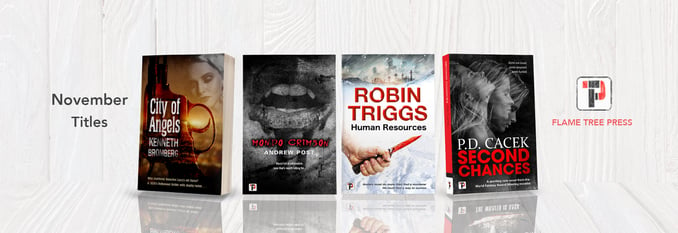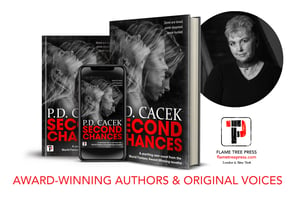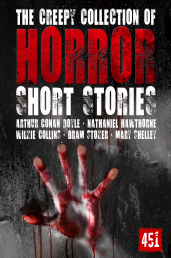In the next of this month's Q&As with our November authors, we have P.D. Cacek, author of Second Chances, the sequel to Second Lives. She discusses which writers influence her, what kind of novel openings she prefers and gives some amazing advice for aspiring writers! Be sure to check in tomorrow for more writing inspiration!

What is the book about?
What is the book about?
The main point of SECOND CHANCES is acceptance—both in accepting people for who they are and, perhaps more so, about accepting ourselves for who we are.
Do you like the slow start or “hook ‘em fast” opening.
I had a slightly easier time with SECOND CHANCES since I set it the same “universe” as SECOND LIVES, four year after the first Traveler arrived, although I have given enough background that anyone who picks up SECOND CHANCES without having read the first won’t have any trouble understanding what’s going on. Since this isn’t really a sequel but more a continuation, I did set the hook a bit quicker. However, I still prefer the slow burn to allow the reader more time to get to know the characters.
Did you base your characters on anyone you knew?
I did base a few characters on people, although most of them are amalgamations. I’ve only intentionally based a character on a person once or twice and that was because they asked.
Which writers have influenced you?
The first, and only because I began reading him when I was still a child, was Ray Bradbury. His style was natural and his stories, even those that took place in the future or on other planets with alien characters, had a strong element of reality to them. He told stories that touched people because they had universal themes.
I’ve also learned a great deal about the craft and art of writing from reading the novels of Peter Straub and Thomas Tessier. Like Bradbury, their novels are based in the “every day” where anything, sometimes horrible things, can happen.
Whenever a story or novel is giving me a hard time, I start reading one, or all, of these authors. I don’t know if it’s the simple act of removing my forehead from where it’s been banging against the keyboard or their wonderful storytelling, but it has never failed to inspire me...or get me back to writing.
Is there any advice you can give someone starting to write?
First and foremost, don’t listen to anyone who calls what you’re doing a hobby. Also avoid getting into arguments when friends or family remind you of how little money you’ll make as a writer or that you’ll never be another Stephen King, Joe Hill or Dan Brown. If you’re serious about writing, you already know it’s not about the money...although it would be nice if it was. And as far as being another King, Hill or Brown why would you want to? Be you and let your writing show it. Take your work seriously. Look around you, observe the big things and the little things and remember them. Memorize smells and feelings and sounds so that when you write about them others will immediately recognize them. Listen to the way people talk, study the cadence and tone so you can reproduce them in words. Believe in yourself and your work and never lose the capacity to pretend or imagine...and never be afraid to write what needs to be written.
Where did you write?
I wish I could be like a number of my fellow writers who take their laptops with them to coffee shops and bookstores and write, but even though I have scribbled down notes (by hand in an old-fashioned paper notepad) or written the first draft of a novel (also by hand and in a notebook) while sitting in my comfy chair in the living room, my primary workspace is my office where I write on an HP touch-screen (which I only realized was a mistake when I got two long-tailed kittens) tucked into a massive cherry-wood roll top. It is a small space, but comfortably filled with books and painting...and cats. It is my sanctuary.
Did you write in silence, or to any particular music?
I need music when I write and generally will either pick a specific CD from my collection or, more times than not, buy a new one that I feel will make good “background music.” My neighbors probably hate me, but when I’m working on a piece, I play the CD constantly, over and over, until I finish the final draft. I listened to Nocturnes of the Celestial Seas, by Richard Nanes while I wrote SECOND LIVES.
Did you find it hard to write? Or harder to edit your own work?
Writing has generally been easy for me since I usually have the story or novel completely written in my head before I sit down at the keyboard. The first thing I do, after the title, is write down the last paragraph or line...this way I know I’ll have an ending. Editing is another matter. I’m not one of those writers who believes that every word she puts down is golden. I know some of what I write is lead—especially in the first few drafts—but sometimes it’s still hard to hit that delete key. So I have to mentally shift gears from hopeful writer to merciless editor (a fiction) and decide if what is written on the page moves the story along or holds it back. It’s still not a lot of fun, but editing can make or break a book and is one of the most important skills a writer needs to learn.
What was it like to be edited by someone else?
I love it and find it both illuminating and valuable. For the most part, writers live in the self-sustaining vacuum located between our ears. We create worlds and situations and people them with bits and pieces of ourselves and call it good...then hope someone else calls it the same thing. In our eyes, we have created a “good book”, why else would we have the audacity to send it to a publisher? And while it might be good, an editor sees only the manuscript—a work in progress. YOU know what you wanted to say, but it takes an editor to let you know if that message got through. Having another set of eyes look at my work has always given me an insight into my own writing that I never would have been able to see by myself.
What are you writing now?
Besides making notes on ABOMINATION, a much darker novel base in the SECOND LIVES world that deals with one man’s fears and hatred of these “traveling souls,” I’m working on a short novel about a woman photographer and her obsession with a child-sized manikin named SEBASTIAN.
Thank you!
Thank you to P.D. for taking the time to talk today about Second Chances. You can pick up her book, along with the other November releases now. It will be available in paperback, hardback and ebook. Check out our website for details.
 P.D. Cacek has published over a hundred short stories and five published novels. A past Guest Lecturer at the Odyssey Writing Camp, Cacek's horror, fantasy and science fiction stories have appeared in numerous magazines and anthologies since going professional in the late 90's. She is also proud of the book she recently co-edited, with Laura J. Hickman, the charity anthology, Now I Lay Me Down to Sleep, with all proceeds going to The Jimmy Fund of the DANA-BARBER Cancer Institute.
P.D. Cacek has published over a hundred short stories and five published novels. A past Guest Lecturer at the Odyssey Writing Camp, Cacek's horror, fantasy and science fiction stories have appeared in numerous magazines and anthologies since going professional in the late 90's. She is also proud of the book she recently co-edited, with Laura J. Hickman, the charity anthology, Now I Lay Me Down to Sleep, with all proceeds going to The Jimmy Fund of the DANA-BARBER Cancer Institute.
Cacek holds a Bachelor's Degree in English/Creative Writing Option from the University of California at Long Beach and is a certified Wilderness Survival Instructor. A native Westerner, Cacek divides her time between Arvada, CO - which looks own on the Mile High city - and Phoenixville, PA - only a short walk from the Colonial Theater where the famous "Run Screaming From Theatre" scene in THE BLOB was filmed. When not writing, she can often been found with THE PATIENT CREATURES, a group of costumed storytellers.
Make sure you check back in with the blog for more Q&As with the authors of our November releases!
- FLAME TREE PRESS |November Releases | 1 | Kenneth Bromberg Q&A
- FLAME TREE PRESS |November Releases | 2 | P.D. Cacek Q&A
- FLAME TREE PRESS |November Releases | 3 | Robin Triggs Q&A
- FLAME TREE PRESS |November Releases | 4 | Andrew Post Q&A
- FLAME TREE PRESS |January Releases | 5 | Upcoming Titles




